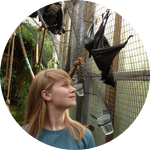About
Since childhood, I have always had a fascination with zoology and the natural world. Whereas some people become inadvertent experts on car models or sports trivia through casual interest, my area of choice was always animals. Starting low-key with various pets, trips to the zoo and a love of natural history programs, this passion for zoology became increasingly prevalent in my career choices as I began to specialise first in biological sciences at A-level and then zoology at BSc Hons level.
With my zoology degree, I quickly gained a part-time job working for Bristol Zoo Gardens which allowed me the time to consider a part-time PhD. For years I was unsure of the topic that my PhD would cover but, after volunteering for 18 months with Bristol Zoo Gardens and working with many of the mammal species present, it was clear that the Livingstone's fruit bats were a high priority.
The Livingstone's fruit bat is a Critically Endangered species, which has currently received very little research attention. This was surprising to me as they are highly social, have a range of interesting vocalisations and are individually identifiable, meaning behavioural study is possible. However, one vitally important project, which I realised would revolutionise their captive breeding program and go a long way to saving the species as a whole, is the production of a family tree or pedigree. Therefore, I signed up to the University of Bristol, UK, with the plan to produce a pedigree analysis for this species, with assistance from my colleague Angelica Menchaca Rodriguez.
As I created my PhD independently, I receive no regular funding and, up to now, I have paid for almost all of my academic fees and expenses using my part-time salary from Bristol Zoo Gardens. This year, I have received so far is £1000 from Bristol Zoo Gardens' staff-development grant towards my academic fees this year (£2,093 for 16/17 academic year).
Joined
October 2016

